外研版(2019)必修第一册Unit 2Exploring English Understanding ideas 课件-(35张ppt)
文档属性
| 名称 | 外研版(2019)必修第一册Unit 2Exploring English Understanding ideas 课件-(35张ppt) | 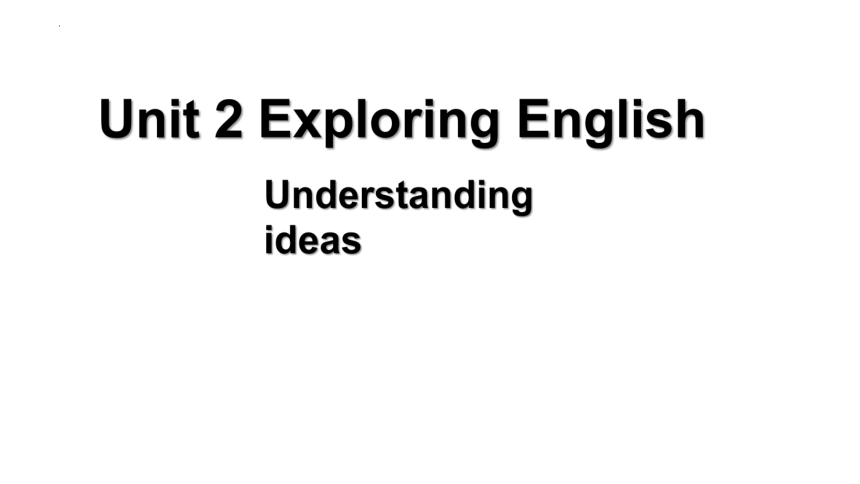 | |
| 格式 | zip | ||
| 文件大小 | 2.8MB | ||
| 资源类型 | 教案 | ||
| 版本资源 | 外研版(2019) | ||
| 科目 | 英语 | ||
| 更新时间 | 2022-07-04 22:55:58 | ||
图片预览

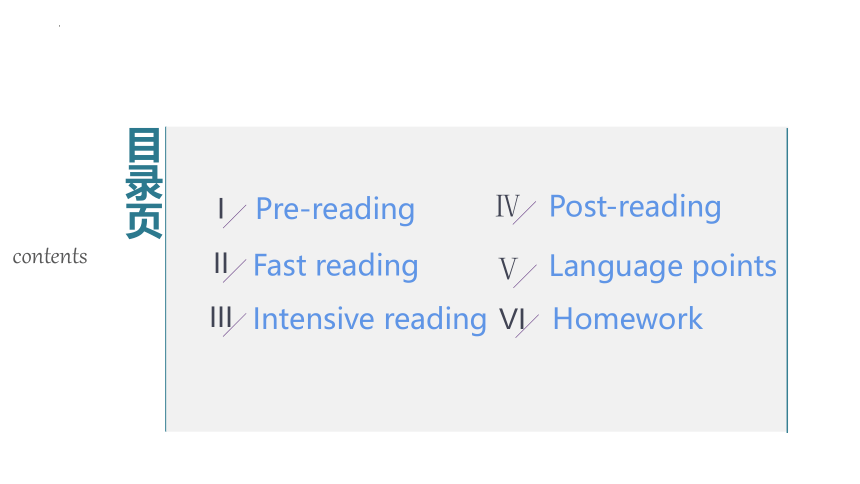
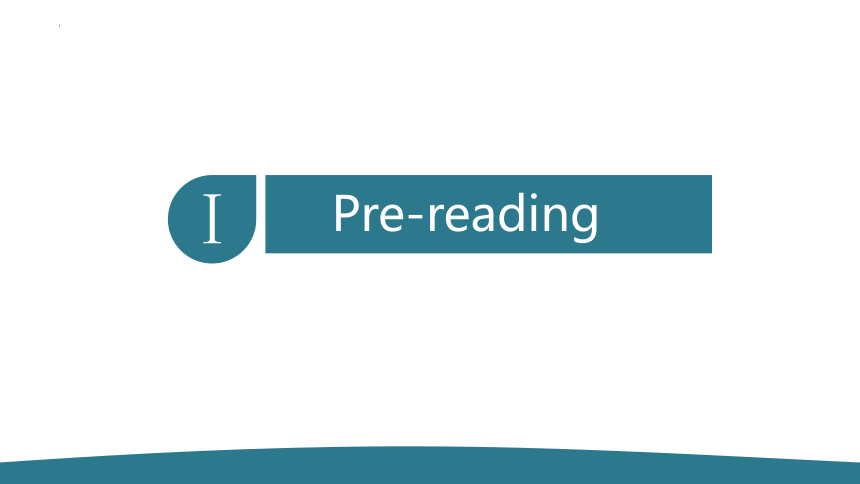
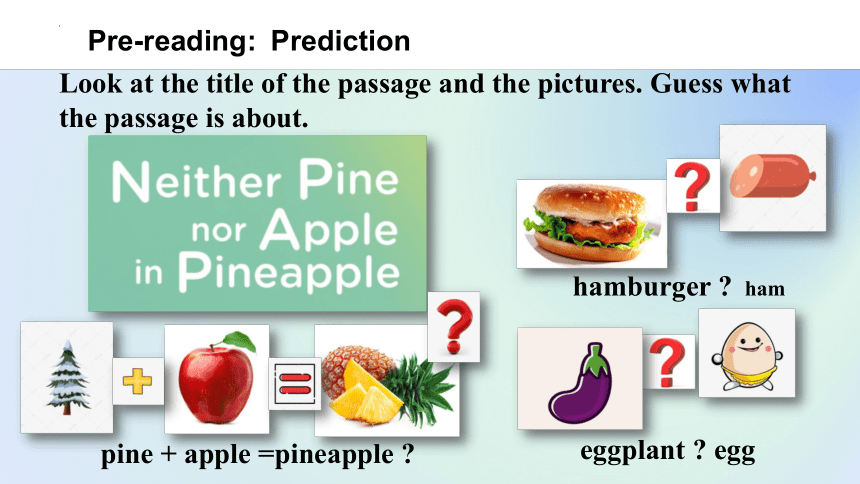
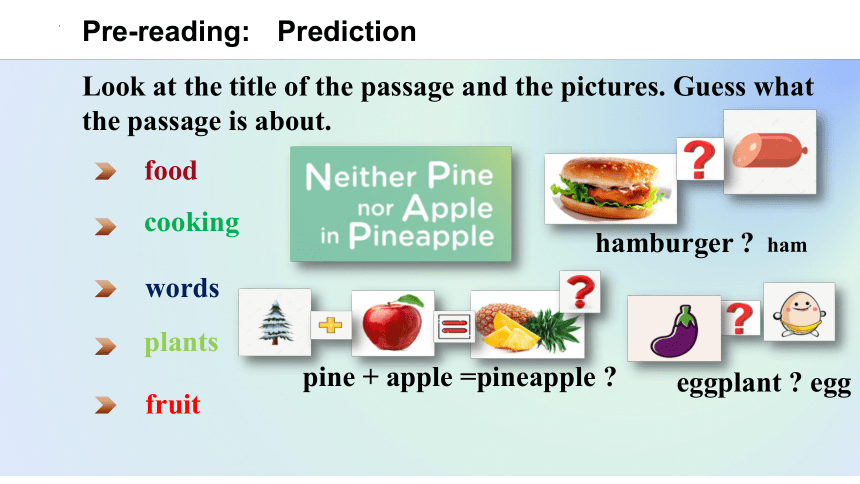
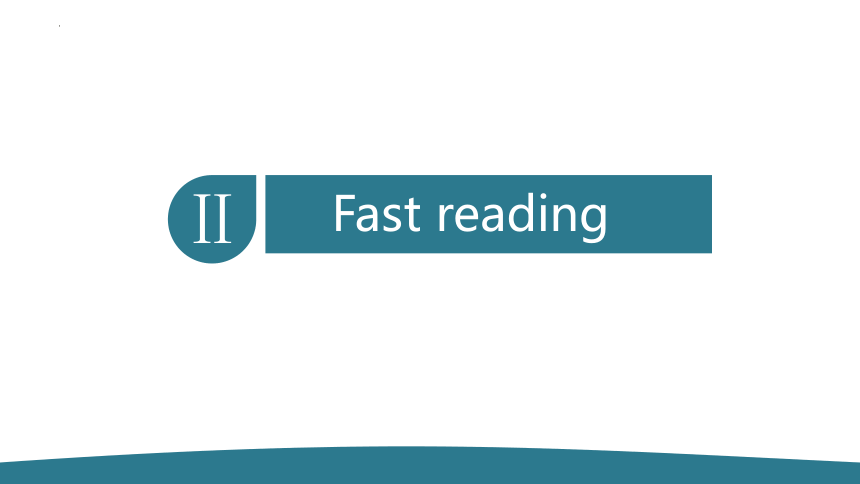

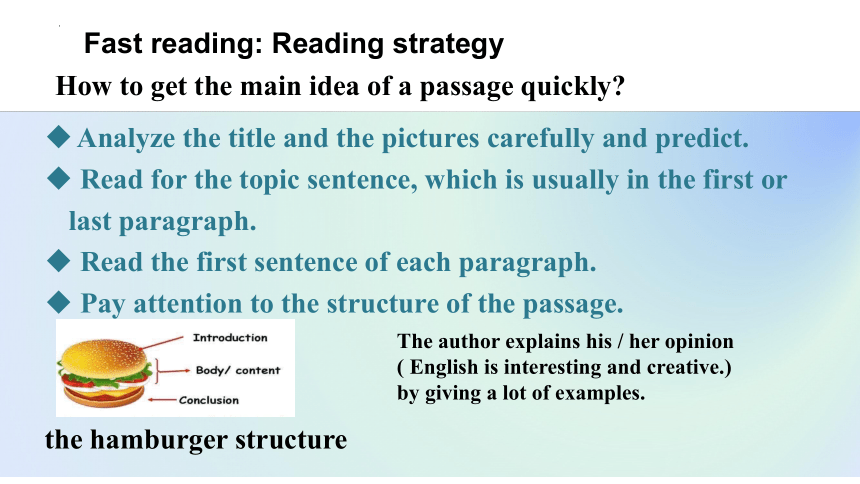
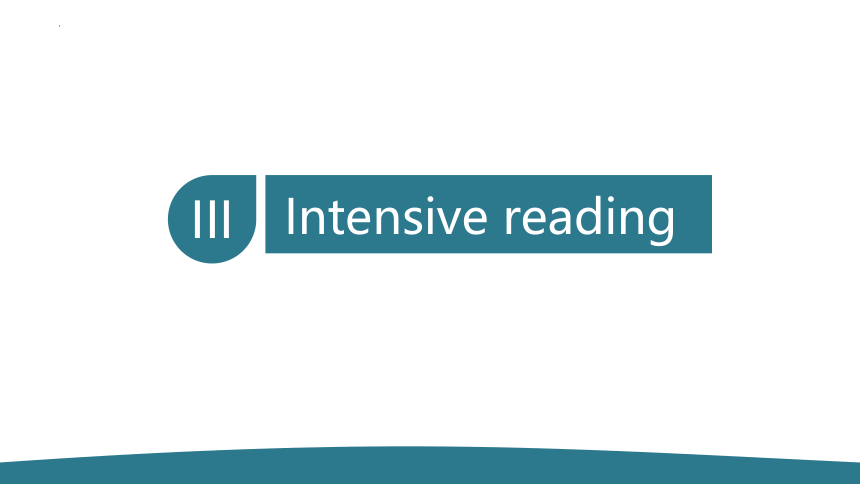
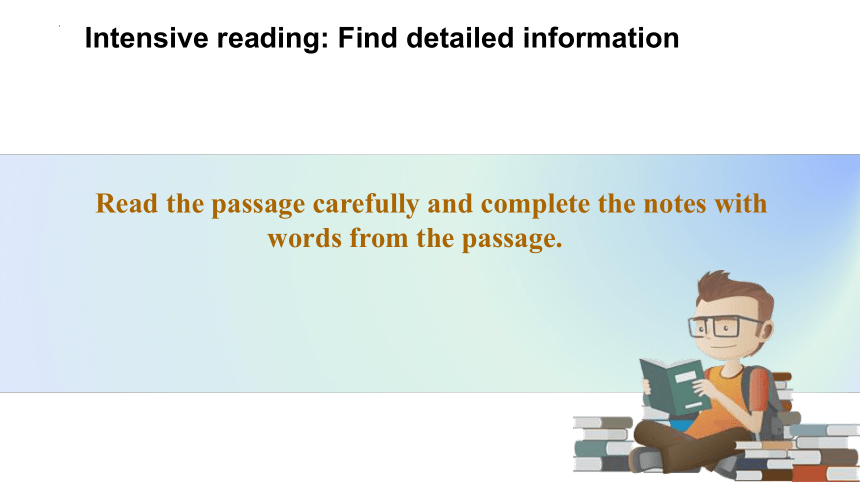
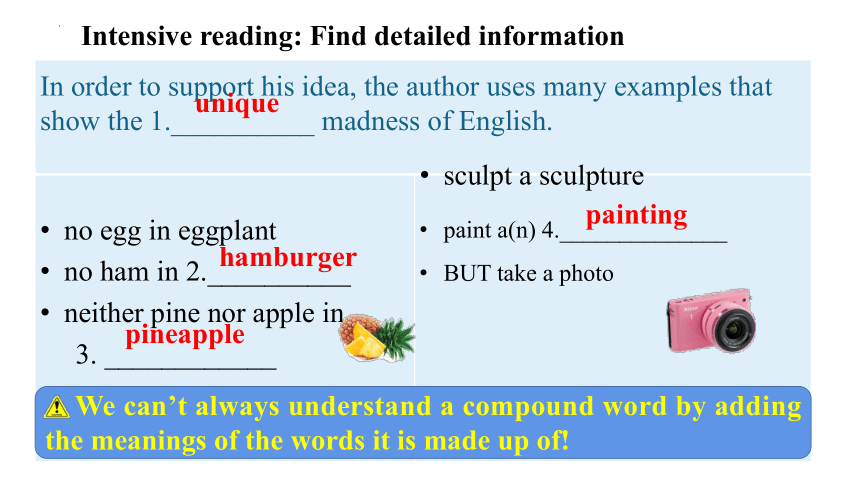
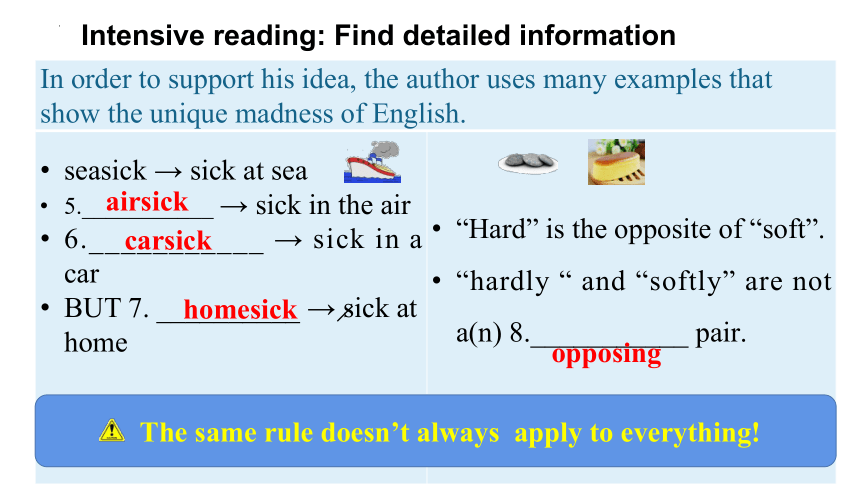
文档简介
(共35张PPT)
Unit 2 Exploring English
Understanding ideas
目录页
contents
Pre-reading
I
Language points
Ⅳ
Fast reading
II
Homework
Ⅴ
Intensive reading
III
VI
Post-reading
Ⅰ
Pre-reading
Pre-reading: Prediction
Look at the title of the passage and the pictures. Guess what the passage is about.
hamburger ham
eggplant egg
pine + apple =pineapple
Pre-reading: Prediction
Look at the title of the passage and the pictures. Guess what the passage is about.
food
cooking
plants
fruit
words
pine + apple =pineapple
hamburger ham
eggplant egg
Ⅱ
Fast reading
1. What is the author’s purpose in writing the passage
A. To tell us that English is difficult to learn.
B. To give advice on how to learn English.
C. To show that English is interesting and creative.
D. To explain how English was created.
2. How did you get your answer
Fast reading: Skim for main idea
Read the passage quickly and answer the questions.
Fast reading: Reading strategy
How to get the main idea of a passage quickly
Analyze the title and the pictures carefully and predict.
Read for the topic sentence, which is usually in the first or last paragraph.
Read the first sentence of each paragraph.
Pay attention to the structure of the passage.
the hamburger structure
The author explains his / her opinion ( English is interesting and creative.) by giving a lot of examples.
III
Intensive reading
Intensive reading: Find detailed information
Read the passage carefully and complete the notes with words from the passage.
In order to support his idea, the author uses many examples that show the 1.__________ madness of English.
no egg in eggplant no ham in 2.__________ neither pine nor apple in 3. ____________ sculpt a sculpture
paint a(n) 4.______________
BUT take a photo
Intensive reading: Find detailed information
unique
hamburger
pineapple
painting
We can’t always understand a compound word by adding the meanings of the words it is made up of!
Intensive reading: Find detailed information
In order to support his idea, the author uses many examples that show the unique madness of English.
seasick → sick at sea 5.___________ → sick in the air 6.___________ → sick in a car BUT 7. __________ → sick at home “Hard” is the opposite of “soft”.
“hardly “ and “softly” are not a(n) 8.___________ pair.
airsick
carsick
homesick
opposing
The same rule doesn’t always apply to everything!
Intensive reading: Find detailed information
In order to support his idea, the author uses many examples that show the unique madness of English.
“Harmless” is the opposite of “harmful”. Shameful and shameless 9.__________ are the same. burn up → burn down
fill in a form → 10. _______a form
behaviors
fill out
Different words or phrases may have the same meaning!
Intensive reading: Find detailed information
In order to support his idea, the author uses many examples that show the unique madness of English.
Stars are out . → They are visible. Lights are out. → They are 11.__________. I wind up my watch. →It starts.
I wind up the passage. →
It 12.________.
The reason is that English was invented by people, and it 13.___________the creativity of the human race.
invisible
ends
reflects
The same words and phrases may have different meanings in different contexts.
How does the author give examples Can you find the sentence patterns the author uses to give examples
The author gives examples mainly by comparing. He uses the following sentence patterns.
For example, we ..., but we ...
If... are..., why are... not...
When we..., we can. But when we..., we can’t....
Intensive reading: Find detailed information
Further reading: The origin of some words
1. The word “pineapple” developed from the Spanish word “pina”, which means pine cone. When it came to England, “apple” was added to show it is a kind of fruit.
2. The origin of “hamburger” was a hard beef steak called “Hamburg steak”, eaten without bread. Later, people reinvented it and called it “hamburger”.
3. Eggplants used to be smaller and yellow or white. They looked a bit like eggs, which led to the name “eggplant”.
Read the following information.
1. How did pineapples, hamburgers and eggplants get their names
2. Does the information above give you a better understanding of the passage Give your reasons.
Further reading: The origin of some words
Answer the following the questions.
V
Post-reading
Post-reading: Retell the passage
Retell the passage with the help of the notes and the sentence patterns.
1. Can you think of similar examples in Chinese For example, there isn’t a wife in a “Laopobing”
2. What do you find most challenging about learning English How do you deal with this
Post-reading: Think and share
IV
Language points
1. What is the opposite of white ( )
2. The post office is opposite the station. ( )
3. “True” and “false” have opposite meanings. ( )
1. opposite
Language points: Important words
Choose the correct meaning of the word “opposite” in each sentence.
① adj. 对面的;相反的
② n. 对立的人或物;对立面;反义词
③ prep. 与……相对;在……对面
①
②
③
Examples:
Water is the opposing force to fire. 水火不相容。
The opposing team won the game. 对方赢得了比赛。
2. opposing
Language points: Important words
adj. 对立的;对抗的;对手的;相反的
1. have trouble (in) doing... _____________________
2. get sb doing _____________________
3. sculpt a sculpture _____________________
4. paint a painting _____________________
5. take a photo _____________________
6. speak of _____________________
have difficulty (in) doing
to make someone do something
雕刻雕塑
画油画
照相
提及
Language points: Important lexical chunks
7. burn up / burn down _____________________________
8. fill in / out a form _____________________________
9. go off _____________________________
10. wind up the watch ____________________________
11. wind up the passage __________________________
离开;(闹铃)响;爆炸
to make the watch work
to bring the passage to an end
Language points: Important lexical chunks
to be completely destroyed by fire
填表
“neither ... nor ... ”句型,意为:既不……,也不……,可以连接两个并列结构。neither和nor均为否定副词,位于句首时,后接部分倒装句,即neither / nor + 情态动词 / 助动词 / be动词 + 主语,如:Neither does she like tea or coffee. 其他否定意义的副词(如little, hardly, nowhere, scarcely, rarely, seldom, never 等)置于句首时,其后的句子也要用部分倒装的形式。
1. Neither is there pine nor apple in pinapple.
Language points: Important sentences
凤梨里面既没有松树也没有苹果。
译文:
did he care
is she late for school
have I met
Language points: Exercise
Complete the following sentences.
1. Little ___________ whether we live or die.
他才不会在乎我们的死活。
2. Never before ___________ such a strange person.
以前我从未见过这样古怪的人。
3. Seldom __________________ .
她上学很少迟到。
2. Read the following sentences and decide what they have in common.
Language points: Important sentences
①Have you ever asked yourself why people often have trouble learning English
②This made me realise that there’s no egg in eggplant either.
③This got me thinking how English can be a crazy language to learn.
这三个句子均含有宾语从句
第一句中why引导宾语从句,在从句中作原因状语,
第二句中that引导宾语从句,在从句中不充当成分,
第三句中how引导宾语从句,在从句中充当方式状语。
Nobody knows whether Tom can complete the project.
Could you please tell me how to use the new cellphone
I wonder why he hasn’t come.
Language points: Exercise
1.没有人知道汤姆能否完成这个项目。
2. 我想知道他为什么还没来。
3. 你能告诉我如何使用这部新手机吗?
Translate the following sentences.
“in which”引导限定性定语从句,修饰先行词language。关系代词which指代先行词language。本句话中,in which意为“在这门语言中”。 “介词 + 关系代词”在从句中作状语。
3. You also have to wonder at the unique madness of a language in which a house can burn up as it burns down.
Language points: Important sentences
你也不得不惊叹一门语言独特的疯狂。在这门语言中一
间房子既可以被“burn up”, 也可以被“burn down”。
译文:
对于“介词+关系代词”结构的使用,重点是要弄清其中的介词如何确定和判断。
1. 根据与定语从句中动词的搭配来确定介词。如:
Water is the natural medium in which fish live. 水是鱼类赖以生存的自然环境。(live in)
2. 根据与定语从句中形容词的搭配来确定介词。如:
He referred me to some reference books with which I am not very familiar. 他我要去参考一些我不熟悉的参考书。(be familiar with)
Language points: Important sentences
对于“介词+关系代词”结构的使用,重点是要弄清其中的介词如何确定和判断。
3. 根据与先行词的搭配来确定介词。如:
I’ll never forget the day on which she said goodbye to me. 我永远不会忘记她与我们告别的那一天。(on the day)
4. 根据句意来确定介词的使用。如:
This is the book from which I got the story. 这就是那本书,从中我读到这个故事。(句意中含有“从……”的意思,故用介词 from)
Language points: Important sentences
for which
in which
about which
Language points: Exercise
Complete the following sentences.
1. The school __________ he once studied is very famous.
他曾经就读的学校非常有名。
2. I know the film ___________ they are talking at the moment.
我知道他们正在谈论的电影。
3. There are many reasons ____________ she likes travelling.
她喜欢旅行的理由有很多。
VI
Homework
Homework
Work in groups, find similar examples in English language and design a poster .
Unit 2 Exploring English
Understanding ideas
目录页
contents
Pre-reading
I
Language points
Ⅳ
Fast reading
II
Homework
Ⅴ
Intensive reading
III
VI
Post-reading
Ⅰ
Pre-reading
Pre-reading: Prediction
Look at the title of the passage and the pictures. Guess what the passage is about.
hamburger ham
eggplant egg
pine + apple =pineapple
Pre-reading: Prediction
Look at the title of the passage and the pictures. Guess what the passage is about.
food
cooking
plants
fruit
words
pine + apple =pineapple
hamburger ham
eggplant egg
Ⅱ
Fast reading
1. What is the author’s purpose in writing the passage
A. To tell us that English is difficult to learn.
B. To give advice on how to learn English.
C. To show that English is interesting and creative.
D. To explain how English was created.
2. How did you get your answer
Fast reading: Skim for main idea
Read the passage quickly and answer the questions.
Fast reading: Reading strategy
How to get the main idea of a passage quickly
Analyze the title and the pictures carefully and predict.
Read for the topic sentence, which is usually in the first or last paragraph.
Read the first sentence of each paragraph.
Pay attention to the structure of the passage.
the hamburger structure
The author explains his / her opinion ( English is interesting and creative.) by giving a lot of examples.
III
Intensive reading
Intensive reading: Find detailed information
Read the passage carefully and complete the notes with words from the passage.
In order to support his idea, the author uses many examples that show the 1.__________ madness of English.
no egg in eggplant no ham in 2.__________ neither pine nor apple in 3. ____________ sculpt a sculpture
paint a(n) 4.______________
BUT take a photo
Intensive reading: Find detailed information
unique
hamburger
pineapple
painting
We can’t always understand a compound word by adding the meanings of the words it is made up of!
Intensive reading: Find detailed information
In order to support his idea, the author uses many examples that show the unique madness of English.
seasick → sick at sea 5.___________ → sick in the air 6.___________ → sick in a car BUT 7. __________ → sick at home “Hard” is the opposite of “soft”.
“hardly “ and “softly” are not a(n) 8.___________ pair.
airsick
carsick
homesick
opposing
The same rule doesn’t always apply to everything!
Intensive reading: Find detailed information
In order to support his idea, the author uses many examples that show the unique madness of English.
“Harmless” is the opposite of “harmful”. Shameful and shameless 9.__________ are the same. burn up → burn down
fill in a form → 10. _______a form
behaviors
fill out
Different words or phrases may have the same meaning!
Intensive reading: Find detailed information
In order to support his idea, the author uses many examples that show the unique madness of English.
Stars are out . → They are visible. Lights are out. → They are 11.__________. I wind up my watch. →It starts.
I wind up the passage. →
It 12.________.
The reason is that English was invented by people, and it 13.___________the creativity of the human race.
invisible
ends
reflects
The same words and phrases may have different meanings in different contexts.
How does the author give examples Can you find the sentence patterns the author uses to give examples
The author gives examples mainly by comparing. He uses the following sentence patterns.
For example, we ..., but we ...
If... are..., why are... not...
When we..., we can. But when we..., we can’t....
Intensive reading: Find detailed information
Further reading: The origin of some words
1. The word “pineapple” developed from the Spanish word “pina”, which means pine cone. When it came to England, “apple” was added to show it is a kind of fruit.
2. The origin of “hamburger” was a hard beef steak called “Hamburg steak”, eaten without bread. Later, people reinvented it and called it “hamburger”.
3. Eggplants used to be smaller and yellow or white. They looked a bit like eggs, which led to the name “eggplant”.
Read the following information.
1. How did pineapples, hamburgers and eggplants get their names
2. Does the information above give you a better understanding of the passage Give your reasons.
Further reading: The origin of some words
Answer the following the questions.
V
Post-reading
Post-reading: Retell the passage
Retell the passage with the help of the notes and the sentence patterns.
1. Can you think of similar examples in Chinese For example, there isn’t a wife in a “Laopobing”
2. What do you find most challenging about learning English How do you deal with this
Post-reading: Think and share
IV
Language points
1. What is the opposite of white ( )
2. The post office is opposite the station. ( )
3. “True” and “false” have opposite meanings. ( )
1. opposite
Language points: Important words
Choose the correct meaning of the word “opposite” in each sentence.
① adj. 对面的;相反的
② n. 对立的人或物;对立面;反义词
③ prep. 与……相对;在……对面
①
②
③
Examples:
Water is the opposing force to fire. 水火不相容。
The opposing team won the game. 对方赢得了比赛。
2. opposing
Language points: Important words
adj. 对立的;对抗的;对手的;相反的
1. have trouble (in) doing... _____________________
2. get sb doing _____________________
3. sculpt a sculpture _____________________
4. paint a painting _____________________
5. take a photo _____________________
6. speak of _____________________
have difficulty (in) doing
to make someone do something
雕刻雕塑
画油画
照相
提及
Language points: Important lexical chunks
7. burn up / burn down _____________________________
8. fill in / out a form _____________________________
9. go off _____________________________
10. wind up the watch ____________________________
11. wind up the passage __________________________
离开;(闹铃)响;爆炸
to make the watch work
to bring the passage to an end
Language points: Important lexical chunks
to be completely destroyed by fire
填表
“neither ... nor ... ”句型,意为:既不……,也不……,可以连接两个并列结构。neither和nor均为否定副词,位于句首时,后接部分倒装句,即neither / nor + 情态动词 / 助动词 / be动词 + 主语,如:Neither does she like tea or coffee. 其他否定意义的副词(如little, hardly, nowhere, scarcely, rarely, seldom, never 等)置于句首时,其后的句子也要用部分倒装的形式。
1. Neither is there pine nor apple in pinapple.
Language points: Important sentences
凤梨里面既没有松树也没有苹果。
译文:
did he care
is she late for school
have I met
Language points: Exercise
Complete the following sentences.
1. Little ___________ whether we live or die.
他才不会在乎我们的死活。
2. Never before ___________ such a strange person.
以前我从未见过这样古怪的人。
3. Seldom __________________ .
她上学很少迟到。
2. Read the following sentences and decide what they have in common.
Language points: Important sentences
①Have you ever asked yourself why people often have trouble learning English
②This made me realise that there’s no egg in eggplant either.
③This got me thinking how English can be a crazy language to learn.
这三个句子均含有宾语从句
第一句中why引导宾语从句,在从句中作原因状语,
第二句中that引导宾语从句,在从句中不充当成分,
第三句中how引导宾语从句,在从句中充当方式状语。
Nobody knows whether Tom can complete the project.
Could you please tell me how to use the new cellphone
I wonder why he hasn’t come.
Language points: Exercise
1.没有人知道汤姆能否完成这个项目。
2. 我想知道他为什么还没来。
3. 你能告诉我如何使用这部新手机吗?
Translate the following sentences.
“in which”引导限定性定语从句,修饰先行词language。关系代词which指代先行词language。本句话中,in which意为“在这门语言中”。 “介词 + 关系代词”在从句中作状语。
3. You also have to wonder at the unique madness of a language in which a house can burn up as it burns down.
Language points: Important sentences
你也不得不惊叹一门语言独特的疯狂。在这门语言中一
间房子既可以被“burn up”, 也可以被“burn down”。
译文:
对于“介词+关系代词”结构的使用,重点是要弄清其中的介词如何确定和判断。
1. 根据与定语从句中动词的搭配来确定介词。如:
Water is the natural medium in which fish live. 水是鱼类赖以生存的自然环境。(live in)
2. 根据与定语从句中形容词的搭配来确定介词。如:
He referred me to some reference books with which I am not very familiar. 他我要去参考一些我不熟悉的参考书。(be familiar with)
Language points: Important sentences
对于“介词+关系代词”结构的使用,重点是要弄清其中的介词如何确定和判断。
3. 根据与先行词的搭配来确定介词。如:
I’ll never forget the day on which she said goodbye to me. 我永远不会忘记她与我们告别的那一天。(on the day)
4. 根据句意来确定介词的使用。如:
This is the book from which I got the story. 这就是那本书,从中我读到这个故事。(句意中含有“从……”的意思,故用介词 from)
Language points: Important sentences
for which
in which
about which
Language points: Exercise
Complete the following sentences.
1. The school __________ he once studied is very famous.
他曾经就读的学校非常有名。
2. I know the film ___________ they are talking at the moment.
我知道他们正在谈论的电影。
3. There are many reasons ____________ she likes travelling.
她喜欢旅行的理由有很多。
VI
Homework
Homework
Work in groups, find similar examples in English language and design a poster .
